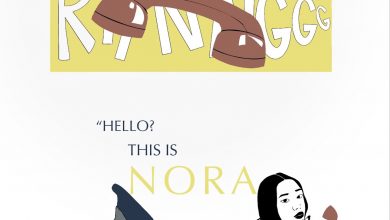Lily Allen: An Alternative to Taylor Swift
When I was in high school, I was an anglophile who was absolutely obsessed with the British pop singer Lily Allen. Although a lot of my friends were unfortunately unfamiliar with Allen, I went to several of her concerts, had photos of her in my locker and, as a shy girl, considered her to be somebody I really wanted to emulate. Admittedly, Allen does not have the reputation of being “a good girl” (whatever that means) and is known for being a naughty socialite who has a sailor’s mouth and loves to drink and party. However, I loved her for being fearlessly opinionated; I admired her unapologetic spunk, brutal honesty, and enviable confidence. Simply put, she is gutsy, strong and refuses to conform to societal expectations of femininity. After Allen decided to take a break, Lady Gaga became the center piece of my musical obsession in university and I regret to say that I absolutely forgot about Allen. The recent news of her birth to a baby girl brought her back into my consciousness and since then, I have been listening to her album “It’s Not Me, It’s You” nonstop. I now realize that beneath many of Allen’s cutesy, yet ballsy pop lyrics were feminist messages that actually influenced many of my thoughts towards femininity, relationships, sex and love; she had a profound influence on my adolescence. Compared to the crooning and pining lyrics of Taylor Swift, Allen’s words can teach a girl a thing or two about being an independent, fierce individual who knows what she wants and will stop at nothing to get it. I have decided to revisit some of Allen’s songs and music videos; I earnestly hope that she will release a new album soon.
“22″
Believe it or not, I was not too crazy about this song when I was sixteen. However, the song’s lyrics are evocative of the many conversations, fixations and fears that I now hear from my friends in college. I can now really relate to this song as my friends and I grow older and realize that we haven’t met some of our goals and are seized by “the fear” that we won’t do so in time. In the song, Allen expresses a clear understanding of how women are treated like commodities with an expiration date. “22” is the age of youth, beauty, fearlessness and desirability. At twenty-two, Allen, in a tone of resignation, artfully implies that a woman is desired for her youth and fresh looks and is highly “marketable.” As a result, the world is at her feet and she has much to look forward to: “the future looked bright.” Now, she is thirty and “is out every night” in search of something fulfilling. The video even features a contrast between a young, polished and glamorous Allen who applies make-up in the bathroom of a club and an older, haggard and tired woman who struggles to put on mascara in a sea of younger woman. I absolutely love the music video — it’s my favorite from Allen. Although the video lacks drama and merely shows the two Allens looking in a mirror, it is an apt manifestation of society’s seemingly timeless and permanent view of women. We are prized for beauty and once our looks fade, we lose our value. The song also carries a Bridget Jones theme: there is a desire for romance and a fear of spinsterhood and being thirty; you can literally hear the biological clock tick in the song’s lyrics.
“It’s sad but it’s true how society says her life is already over There’s nothing to do and there’s nothing to say ‘Til the man of her dreams comes along Picks her up and puts her over his shoulder It seems so unlikely in this day and age”
“The Fear”
This is the song that made me realize that Allen is truly something special. “The Fear” castigates the media’s portrayal of women and its role as an educator to young girls. The media does not only teach women to be merely vacuous, beautiful decorative objects, but also espouses an excessive materialism and a damaging superficiality. She satirizes these superficial desires and aspirations by singing with an ironic, sarcastic tone. Additionally, the song and video addresses the problems with our fame and celebrity obsessed culture. In the age of Kardashian, this song is especially relevant. The line “life’s about film stars and less about mothers” sums up the notion that young girls lack good role models. Girls are instead obsessed with mindless consumerism and their image. Girls could care less about the world around them “as long as they are getting thinner.” She recognizes an egregious disregard for intellect, morals, values, ethics and personality. The visually lush video features Allen leaving a humble motor home for a grand mansion replete with pastel colored gift boxes and dapper, stylish dancing butlers.
“I want to be rich and I want lots of money I don’t care about clever I don’t care about funny I want loads of clothes and fuck loads of diamonds I heard people die while they are trying to find them And I’ll take my clothes off and it will be shameless Cause everyone knows that’s how you get famous”
“Not Fair”
“Not Fair” is my favorite song off the album not only because I think it’s irresistibly cute, but because I believe it dares to address a topic rarely touched upon in pop music (or anywhere, for that matter!). I applaud Allen for addressing the issue of the importance of a woman achieving sexual satisfaction in a relationship. The song discusses a dilemma that perhaps many women face: a man who seems to be a perfect and sweet boyfriend but fails to satisfy in the bedroom. The song basically tells the tragic story of the selfish lover. She thus debates whether or not she should dump him. I love the song’s endearingly simply lyrics and its rather juvenile tone. Allen humorously adopts the role of a petulant, whiny child who instead of pining for a cookie before dinner, simply just wants to get an orgasm from her mate and “scream.” For example, the lyrics “It’s not fair/ And I think you’re really mean/ I think you’re really mean!..and it’s really not okay!” sounds like a young school girl begging for playground justice. I believe this tactic is not only funny and cute, but is also helpful in conveying the fact that Allen’s desire is simple and natural. Also, she is truly being treated with an injustice. After all, all her boyfriend “does is take” and it truly is “not fair.” She audaciously illuminates a problem that plagues many couples. She also shows that women love and want sex; they are not merely instruments of pleasure to be used. More importantly, she demands that men return the favor!




